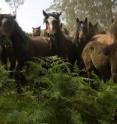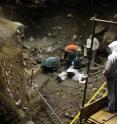Wild Iberian horses contributed to the origin of the current Iberian domestic stock
The earliest known domestic horses are around 4,600 years old. They were originated in the steppes between modern Ukraine and Kazakhstan. Using this evidence, two different hypotheses have been suggested: 1) domestic horses spread from this area over the rest of Eurasia; 2) horse domestication was a multiregional process, having occurred several times in different local places. "Previous analysis on mitochondrial DNA from modern Iberian horses pointed to the D1 haplogroup as the most likely group involved in an independent domestication event, maybe in Iberia or in North Africa" explains Anders Götherström from the Department of Evolutionary Biology at Uppsala University, who headed the project together with Juan Luis Arsuaga of the Centro Mixto UCM-ISCIII from Madrid (Spain).
The researchers have compared the ancient Iberian sequences from Iberian Neolithic, Bronze Age and Middle Ages obtained in this study with more than 1,000 modern horse sequences from different Iberian and non-Iberian breeds, as well as with ancient sequences from other studies.
The researchers found the earliest occurrence of the D1 group in Iberia in a medieval horse. "We have not found sequences from the Neolithic or the Bronze Age period associated to the most important modern Iberian haplogroup, the D1 group. That means that D1 group can be a foreigner group, which entered in Iberia during historical times" says Jaime Lira, of the Centro Mixto UCM-ISCIII from Madrid and the main author of this study.
Furthermore, wild horses from Iberia contributed to the domestication process, and the Lusitano group C is a witness from this event. "The Lusitano C is a small group constituted only by modern horses from Iberian origin. We have found that maternal lineages from this group were already present in wild Iberian horses from the Early Neolithic, continuing through the Bronze Age until nowadays." explains Juan Luis Arsuaga. These results suggest the possibility of a completely independent domestication episode, or the use of Iberian maternal lineages in a restocking process from the wild.
Source: Wiley-Blackwell
Other sources
- Wild Iberian horses contributed to the origin of the current Iberian domestic stockfrom Science BlogThu, 7 Jan 2010, 17:36:14 UTC
- Wild Iberian horses contributed to origin of current Iberian domestic stockfrom Science DailyThu, 7 Jan 2010, 17:35:51 UTC
- Wild Iberian horses contributed to the origin of the current Iberian domestic stockfrom PhysorgThu, 7 Jan 2010, 17:28:14 UTC

